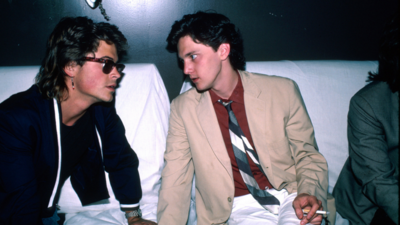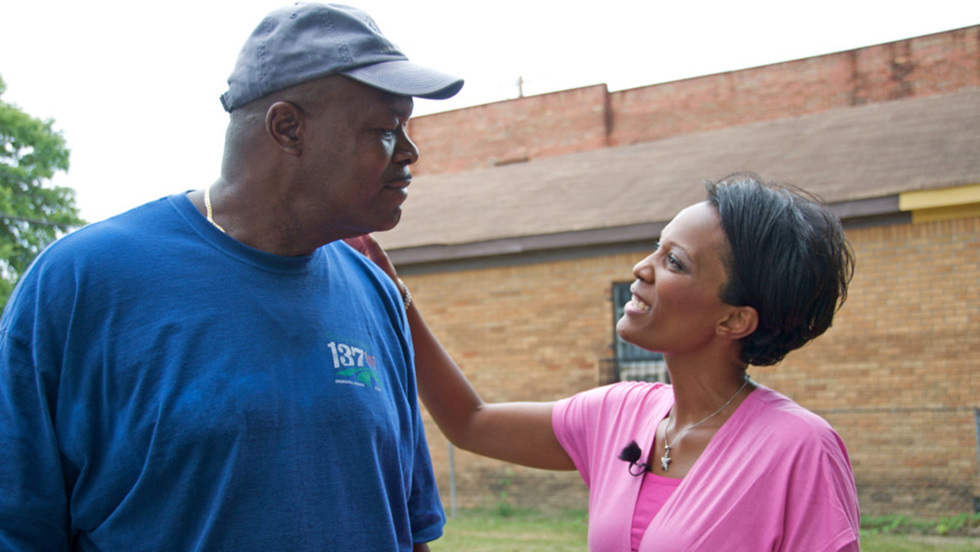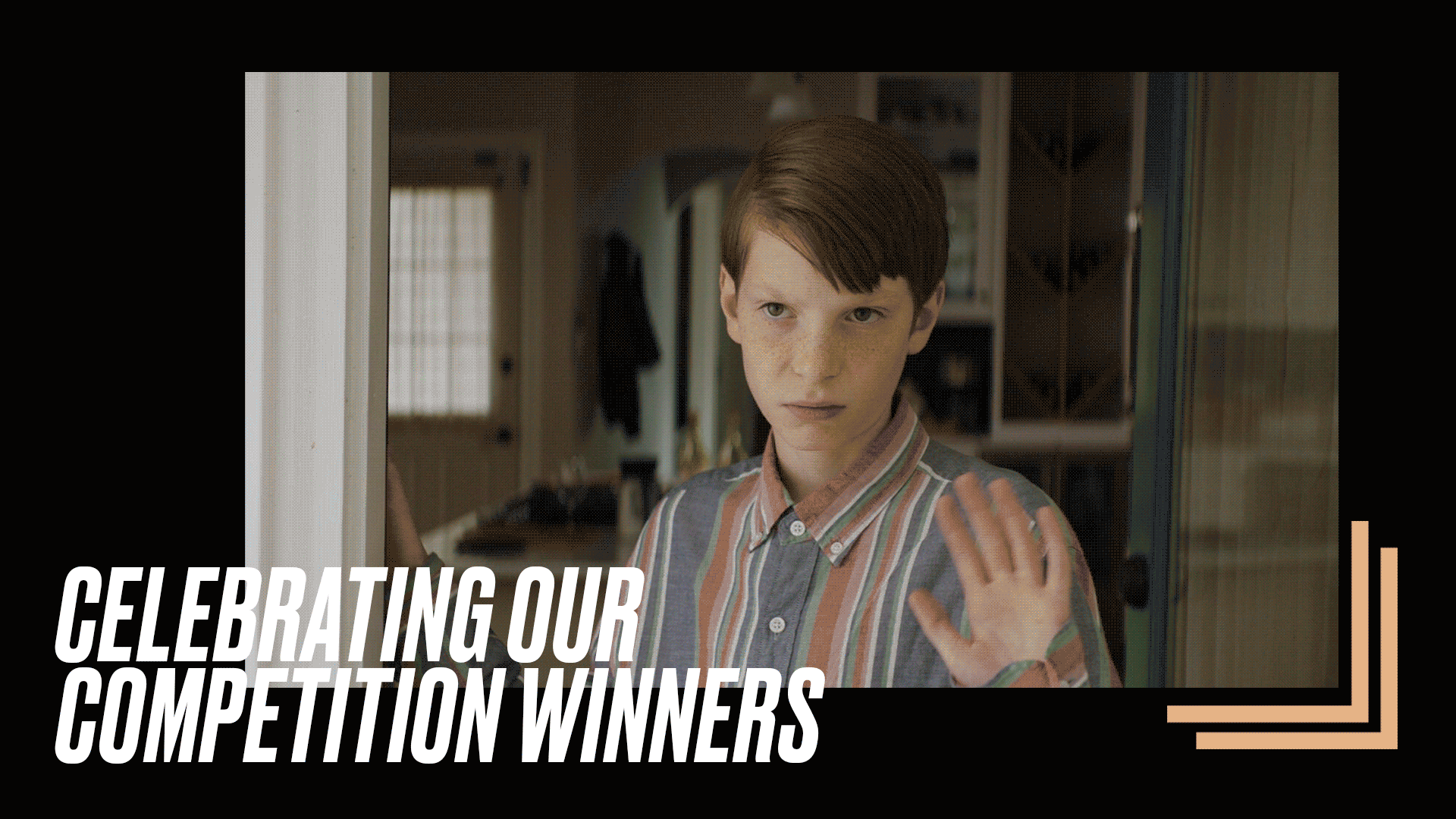
BY KRISTIN MC CRACKEN |
Deconstructing the Myth of Booker Wright
Raymond De Felitta returns to Tribeca with a moving documentary that ties his own history with that of an emblem of the segregated South. Booker's Place: A Mississippi Story debuts on demand on April 26.

Tribeca: Tell us a little about Booker's Place: A Mississippi Story. How do you describe the film in your own words?
Raymond De Felitta: I think of Booker's Place: A Mississippi Story as a dramatic, narrative documentary. It's factual, but we also try to find a way to build it like a drama so that the events unfold in front of you.
Tribeca: So I know there's a great story behind how this movie came to be. Can you give us a little synopsis of that?
Raymond De Felitta: My father, Frank De Felitta, made seven or eight documentaries for NBC in the 1960s. I think they're wonderful time capsules; almost all of them are about current events. One in particular, I thought, was still so powerful because it was about the South and the Civil Rights era.
When I found out that my father had made this film with Booker Wright, I was fascinated by Booker’s appearance. And then when I met his granddaughter, Yvette, and found out what happened to Booker, I realized there was another story to tell—another permutation, really, to go through. So Yvette's search for the story of her grandfather, and my search for understanding the impact that my father's film may have had, really, on Booker’s life, became the unfolding dramatic narrative.
Tribeca: When did you see your Dad’s films? Did your dad have copies for himself? How did you learn about Yvette?
Raymond De Felitta: Yes, my father used to screen them when I was growing up. He would thread them up on the projector, so I grew up knowing these movies, and I loved the idea that they were this record, of sorts, of that decade.
So I got this idea because I'm a bit of an overcommitted blogger, and I love the advent of YouTube—so much material is out there now. So I thought, Let's just post [my dad’s film] up there and see if anybody's interested in it. And almost immediately it got a whole bunch of hits, and it turned out that people had been interested in the film, but they didn't know where to find it.
One of the people who found it was Booker's granddaughter, Yvette, and she'd never seen that piece of film on her grandfather. She'd heard about it; it was kind of legend in her family—but it got spoken about in a way that wasn't quite the reality of it. People always said, “Well, the NBC crew was filming the Civil Rights demonstrations in Greenwood, and they asked Booker a question on the street, and he said something a bit off-the-cuff, and it was quite volatile, and it made a big difference in the community.” And of course if you see the film, that's not at all what happened.
Booker gave a prepared and very emotional speech, and as Yvette says in the film, he knew whom he was going to implicate. He knew the gravity of what he was doing. It was indeed a really fearless moment, and it changed his life, and it changed the community. But that piece of film was sort of just lost. It was just this myth...
Tribeca: And how long was the film?
Raymond De Felitta: About an hour. It fit an hour time slot on network television, so a little less.
Tribeca: How about that? Networks made documentaries.
Raymond De Felitta: The way my father explained this was that the networks, up to a certain time, felt that they had a duty to the American public to provide informational programming; all of the money-making opportunities they had for commercial programming had to be rolled back in some way to public service. So they funded the documentary units, and this is pre-60 Minutes, but in a funny way they were also aired on Sunday, in the 5:00 or 6:00 time slot, which was not a big viewership, but it was important for them; it was like a social good that they were performing. At some point in the late 60s, the filmamkers all got pink-slipped, and the closed the units down; it just was no longer worth the money to the new people that were running the networks.
Tribeca: And now we have The Real Housewives of New York City instead.
Raymond De Felitta: Yeah, which you can consider a documentary, I guess. [Smiles.]

Tribeca: So you connected with Yvette, and was she open to this? Did you have the idea for making another film right away? Is talking with her what inspired you?
Raymond De Felitta: Actually my producer, David Zellerford, is the one who kind of cooked the whole thing up. As we talked about the fact that we're all connected by this old piece of film that my father made, we conceived the idea of going back and making a short documentary. Really the first idea was: Let's go back and see what Yvette can find out about Booker. Then it grew into: Could we go to Greenwood then and now? That started to expand the film, but then when we found out that Booker had been murdered, and when it became clear that the murder was murky, then I began to think this had something to do with his appearance in my father's film. That then became the story, and was realized it was not a 20-minute film.
Tribeca: This is such a personal story for you. What do you hope that audiences take away from the movie?
Raymond De Felitta: The interesting thing to me is always locating in one person the story of something larger around them, and the impact that one small act can make. When Booker agreed to go on camera, he decided to explode a lot of his life and the myth of who he was. It took two minutes, and it made a huge impact on his community. That ripple effect went all over the South, because people realized that black people were now brave enough to go on TV and say [something like] that and accept the consequences.
He was just one guy. And he ran a little cafe, and he worked at another restaurant. He was a very modest fellow who made a huge impact. To me, that's personalizing, and the more personal, the more universal.
Tribeca: So what's the craziest thing, or lightning strikes moment, that happened during production?
Raymond De Felitta: There was a moment—and it's in the film—that actually changed the course of the film. We had known from my father's interview that Booker had been beaten up and hospitalized as the result of his speech. I didn't know how to corroborate that beyond the fact that my father knew this.
I interviewed a wonderful man, Judge Gray Evans—a retired judge and a major political force in Greenwood—and a progressive one, I may add. He was a white guy that “got it” early on. He dropped a big bomb on us: he said he knew about Booker’s beating, and if he'd been able to, he would have filed charges against the policeman… and he gave us the policeman's name. And suddenly a whole story began to unfold: there was a cop who was after Booker. I don't know exactly where [it ended], because we can't prove how it ended, but he was a hunted man. And we learned about it, and it happens on camera, which is always an amazing moment in a documentary, I think.
Tribeca: And Judge Evans was not able to file charges because there was no evidence or because of the culture of the town?
Raymond De Felitta: I think the latter. I think that there probably wasn't enough evidence, but I think it was also largely because Greenwood, in the 60s, was a terrorist state. And the police, as we talk about in the movie, they ruled. So it would've been a very big deal to pursue something like that in that town. They were protected.
Tribeca: You've made both docs and narratives. Can you talk about the difference in for you?
Raymond De Felitta: I've always been a historian at heart, but I never set out to become a documentary maker. The big difference is, especially these days, you can just go do a doc. If you have a little money and a little equipment, you can just go make your film. You don't have to ask for permission; a doc can really be done on your own. And that's sort of the wonderful turn of technological events in the last ten years. You can make a handsome-looking film; all you need is a camera and a computer.

Tribeca: Your last film, City Island, won the Heineken Audience Award in 2009. What are you most looking forward to about your return to Tribeca?
Raymond De Felitta: Well, first of all, it's in New York City, which to me is a big plus. You don't have to go to a little town with snow in it… and I'm a New Yorker, so I appreciate that. And I've never had a documentary at Tribeca.
Tribeca is a very welcoming and friendly Festival—distinguished without being stuffy. And I want an audience to see my movie—just as they saw City Island. I'm trying to make a movie for any audience to watch—it’s not an elite audience, it’s not an art house film—at least I don't think it is. So I think this is the perfect Festival in which to premiere Booker's Place: A Mississippi Story.
Tribeca: If you could have dinner with any filmmaker alive or dead, who would it be?
Raymond De Felitta: I was always fascinated by Abel Gance, who made the great silent, Napoleon, and a lot of wonderful films. He was a great innovator, and then lived in obscurity for many, many years, and I always wonder what was he doing and what was he thinking all that time. I hear he was wonderful company, too. And he was French, so I'm sure it would've been a lovely meal.
Tribeca: What's your favorite New York movie?
Raymond De Felitta: I think it's always been Annie Hall. I never get tired of it. In fact, I saw it recently, and every line is a smash-out-of-the-park hit. It's just perfectly constructed. And it makes you long for New York in the 70s. Even though it's a very different New York, it's still New York. It's a perfect evocation of the city.
Tribeca: What would your biopic be called?
Raymond De Felitta: I plan on writing a memoir one day called Raymond De Felitta: A Life at Home, because I never leave the house. I didn't realize when I became a writer that essentially what that means is nothing happens to you. My life is lived at home.
Tribeca: Finally, what makes Booker's Place a Tribeca must-see?
Raymond De Felitta: It's black and white. And that's just too hip for words, isn't it? [Laughs.] I mean, it's a black and white documentary set in the South about a really depressing topic, using old black and white footage. Does that say Tribeca? I think it does, for some reason.

Raymond De Felitta was nominated for an Oscar in 1990 for his AFI thesis short, Bronx Cheers. His 1995 film Cafe Society premiered at Directors Fortnight. His indie Two Family House won the Sundance Audience Award, and his 2009 feature City Island won the TFF Heineken Audience Award.
Note: Booker's Place: A Mississippi Story will premiere on VOD across the country via Tribeca Film on April 26, and in select theaters the same week. Learn more.

